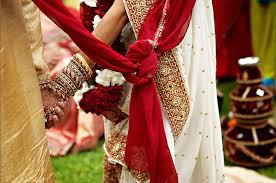Khaps Approve Inter-caste Marriages, Break Traditional Barriers.

Khap panchayats have always been in the news for the wrong reasons but it now looks like the Khaps are trying to make history by relaxing their obnoxious restrictions of their traditions from more than 650 years. Haryana’s biggest khap panchayat, Satrol khap in Hisar on April 21 gave approval to inter-caste marriages that have in the past triggered bloody killings in the state and surrounding regions. The decision of the Satrol khap panchayat to allow inter-caste marriage in 42 villages falling under its jurisdiction in Narnaund block of the district has got the stamp of approval from the sarv khap mahapanchayat and many other khaps, which termed the decision as “pragmatic” and “in tune” with the changing times. The decision was welcomed by the different Pradhans and Representatives. They also stated that the Satrol khap has shown the way to overcome traditional barriers and that the step would even help in the development of the region & strengthening of ties between the different villages.
The Khaps, in the name of tradition, have long been opposed to inter-caste marriage and inter-village marriages. These restrictions have also resulted in several honour killings in the state including Manoj-Babli honour killing case from Kaithal district and Dharmendra-Nidhi honour killing from Rohtak district. There are no official figures on honour killings in India, but All India Democratic Women’s Association estimate that about 1,000 such cases are reported across India every year.
This move taken by the Khap panchayats has gained appreciation throughout the country. Head of the Satrol Khap, Subedar Inder Singh (retired) said the youth, who were earlier not permitted to marry within 42 villages, are now free to do so be it in their caste or outside it. “We want to keep our traditions in sync with modernity and prevailing social circumstances of relevance,” he said. Baljit Singh Malik, Pradhan of Haryana’s biggest and progressive Gathwala Khap in Sonepat, said it was a welcome move and the need of the hour. Ishwar Singh Punia of the Punia Khap also welcomed the development.
The Khaps have also taken some other steps against the traditions that would eventually help in the development of the region itself. Women in Haryana were not even allowed to sit in Khap meetings, but slowly this rule is changing too. Khaps have slowly started accepting the role of women in decision making. “It is a welcome sign,” says Dr Dahiya, “In contrast to the earlier times, most women in villages today are well-read and educated and are capable of taking their own decisions. It is high time that women should be given a just place in the Khaps and allowed to become a member of decision makers in the Jat community. The Bibipur experiment in which women were allowed to sit in the Khap meeting is encouraging and it must be replicated in other parts of Haryana,” she said.



